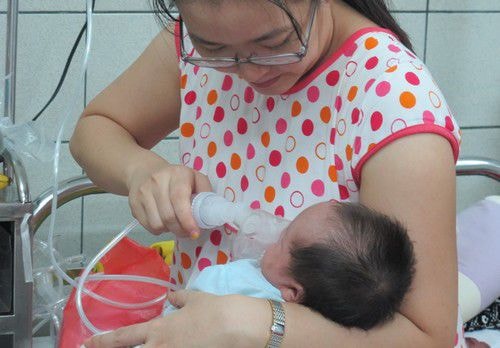When do children with respiratory diseases need antibiotics?
Scientific evidence shows that respiratory infections have many causes, about 2/3 are viral. Antibiotics do not kill viruses, and if used incorrectly, can cause children to have allergies, diarrhea, fatigue, etc.
Dr. Nguyen Tien Dung, former head of the Pediatrics Department at Bach Mai Hospital (Hanoi), said that the main cause of respiratory diseases in children is viruses. However, the number of antibiotic prescriptions always exceeds the rate of respiratory infections caused by bacteria.
There are many reasons for prescribing antibiotics. First, the patient's family requests antibiotics. Many people consider antibiotics to be a "cure-all": sore throat, fever, runny nose... all immediately think of using antibiotics. In addition, the doctor's examination time is too short, leading to an uncertain diagnosis or not having enough time to explain to the family why antibiotics are not needed.
 |
Illustration: NP
According to Dr. Dung, in the context of limited testing, correctly assessing clinical symptoms will be very helpful in predicting the possibility of infection in patients. Clinical comparative evidence shows that 60% of patients with sinusitis lasting more than 10 days are due to bacterial infection. Otitis media with effusion in children is mostly not due to bacterial infection. Unknown upper respiratory tract infections and acute bronchitis in previously healthy bodies are mainly due to viruses.
For example, sore throat can be caused by viruses and streptococci. If caused by viruses, children often have symptoms of conjunctivitis, runny nose, cough, diarrhea, and viral rash. If caused by streptococci, the patient often has a fever above 38.5 degrees Celsius, swollen and painful lymph nodes in the neck, headache, petechiae in the palate, abdominal pain, sudden onset of the disease (less than 12 hours), and secretions from the throat and tonsils.
The World Health Organization recommends considering strep throat if a child has at least the following signs: red throat, swollen tonsils, white secretions and swollen and painful neck lymph nodes. “If there is only a red throat, it is usually a viral sore throat. Children with strep throat need to be treated properly and with enough antibiotics to prevent complications of acute rheumatic fever that can affect the heart, which will be very difficult to treat later,” said Dr. Dung.
Viral infections do not require antibiotics, the disease will heal on its own, supportive treatment is necessary to help children recover quickly. Using antibiotics in these cases does not help the disease heal faster but also makes children tired, lose appetite, and can even lead to prolonged diarrhea, allergies...
Incorrect and inappropriate use creates favorable conditions for drug-resistant bacteria to appear, spread and last for a long time. Antibiotics are considered "reserve" for use in truly dangerous cases, so they should not be abused. When sick, you should see a doctor and not take medicine on your own, especially antibiotics. When taking medicine, you need to follow 4 rules: correct indication, dosage, time and method of use.
According to VnExpress






